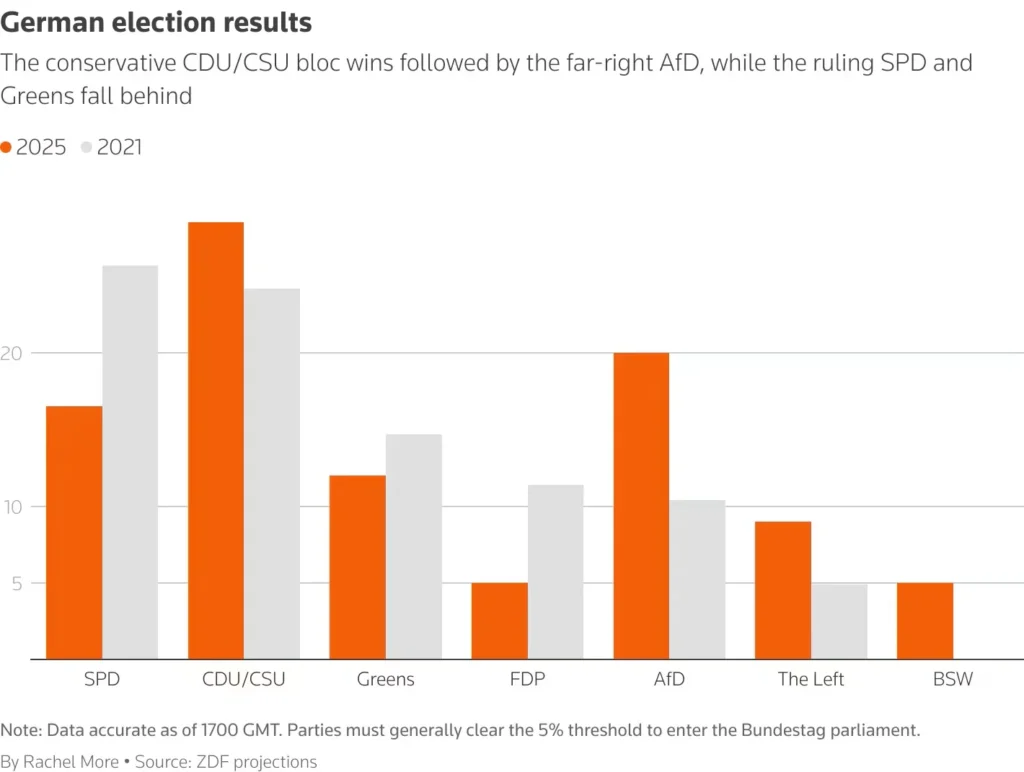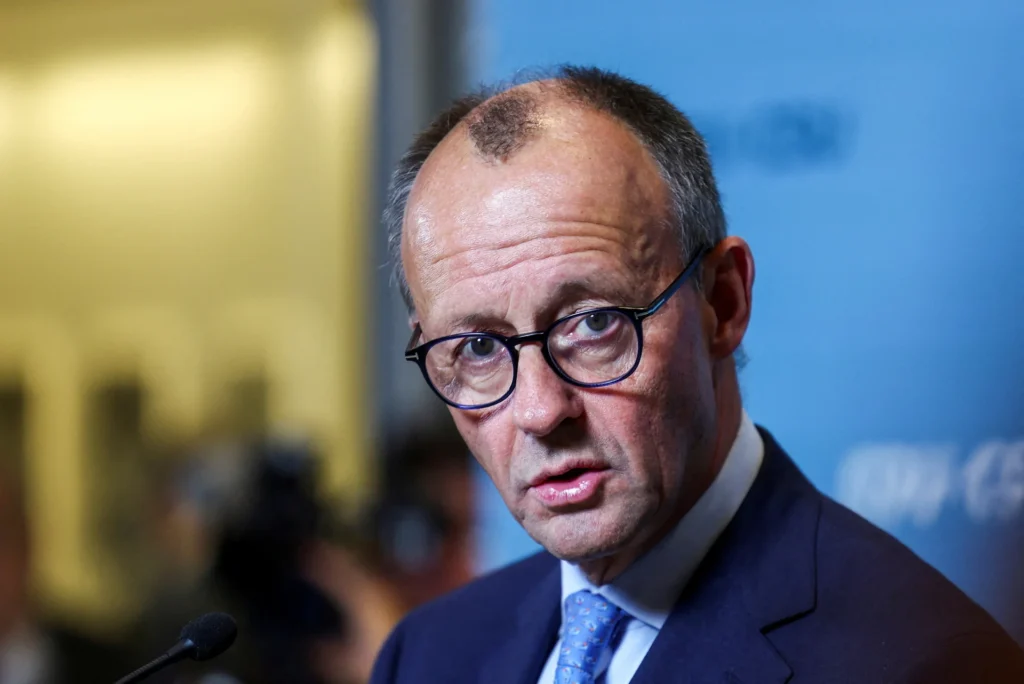Germany Votes for Change: A Conservative Resurgence
German election 2025 has led to a major political transformation, as voters moved away from the ruling coalition, propelling the conservative Christian Democratic Union (CDU) and its Bavarian counterpart, the Christian Social Union (CSU), back to power. Under the leadership of Friedrich Merz, the CDU/CSU secured a strong electoral victory, reinforcing their status as Germany’s dominant political force. The far-right Alternative for Germany (AfD) made unprecedented gains, finishing second with 20.8% of the vote, marking their most significant performance yet.
Meanwhile, the Social Democratic Party (SPD), led by Chancellor Olaf Scholz, suffered a historic setback, seeing a nearly 10-point drop in support compared to the 2021 elections. This dramatic shift signals voter discontent with the SPD-led government’s handling of economic and immigration policies.
Key German Election 2025 Outcomes: Who Won & Lost?
The results of the 2025 German elections indicate a sharp rightward shift in the electorate. Here’s a look at the biggest triumphs and setbacks:
- CDU/CSU: 28.6% (Projected 208 seats in Bundestag)
- AfD: 20.8% (Projected 152 seats)
- SPD: 16.4% (Projected 120 seats)
- The Greens: 11.6% (Projected 85 seats)
- The Left: 8.8% (Projected 64 seats)
- Sahra Wagenknecht Alliance (BSW): 4.97% (Did not meet 5% threshold for Bundestag entry)
- Free Democratic Party (FDP): 4.3% (Lost all 91 seats)

The CDU/CSU’s victory was expected, but the rise of AfD to second place has stunned many analysts. The SPD’s collapse and the FDP’s complete exit from parliament indicate voter dissatisfaction with centrist and left-leaning policies.
Why Did Voters Shift Right?
Several pressing issues shaped voter decisions, driving support toward conservative and far-right parties.
1. Economic Uncertainty & Stagnation
Germany’s economy has been stagnant for the past two years, with inflation and slow growth weighing heavily on public sentiment. Voters viewed the SPD-led government as ineffective in reviving economic dynamism, leading them to back the CDU/CSU, which promised business-friendly policies and a return to fiscal discipline.
2. Immigration & Border Security Concerns
Germany has seen a rise in migration-related issues, with several high-profile crimes committed by migrants fueling a national debate on border security.
- Merz pledged stricter border controls and a more aggressive deportation policy.
- AfD capitalized on anti-immigrant rhetoric, positioning itself as the party of law and order.
This resonated strongly with voters, particularly in Eastern Germany, where AfD performed the best.
3. Foreign Policy & the Ukraine Conflict
The ongoing Russia-Ukraine war played a role in the elections, as voters debated Germany’s position within Europe’s security framework. Merz has vowed to support Ukraine but has also pushed for greater European defense autonomy, signaling a possible shift away from reliance on U.S. military backing.
Who is Friedrich Merz, Germany’s Likely Next Chancellor?

Friedrich Merz, a 69-year-old corporate lawyer-turned-politician, has had a long and complex political journey:
- 1989: Elected to the European Parliament
- 2000: Became CDU’s parliamentary leader
- 2009: Left politics for the private sector, working with BlackRock Germany
- 2022: Re-elected as CDU leader following Merkel’s retirement
Merz is a social conservative with a strong focus on fiscal responsibility, European independence, and stricter immigration policies. He has explicitly ruled out forming a coalition with AfD, despite their rising influence.
AfD’s Record Performance: What It Means for Germany
AfD’s breakthrough to 20.8% represents a turning point in German politics, signaling increasing support for nationalist, anti-immigrant, and Euroskeptic views.
- The party performed exceptionally well in Eastern Germany, where economic challenges and migration concerns have fueled populist sentiment.
- Despite their record results, major parties—including CDU/CSU—refuse to form a coalition with them.
AfD’s growing presence in Bundestag ensures that conservative and nationalist policies will feature more prominently in German political discourse moving forward.
What’s Next? Coalition Talks & Government Formation
With 316 seats required to form a government, Friedrich Merz now faces challenging coalition negotiations:
- Grand coalition with SPD: Possible but difficult, given ideological differences. (Would hold 328 seats)
- Three-way coalition with The Greens & The Left: Less likely due to conflicting policy stances.
Merz aims to finalize a coalition by Easter 2025, but political experts predict long, difficult negotiations before Germany’s next government is in place.
Final Thoughts: A Turning Point for Germany?
The 2025 German election has reshaped the nation’s political landscape, signaling a shift toward conservatism and nationalism. While Friedrich Merz prepares to take over as Chancellor, the rise of AfD introduces a new dynamic that will continue to influence German politics in the years to come.
With coalition talks underway, Germany’s future policies on immigration, economy, and foreign relations will be determined in the coming months. The next government will have the challenging task of maintaining stability while addressing growing divisions in society.


